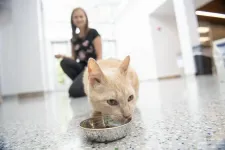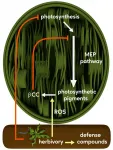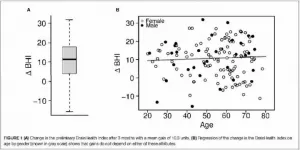(Press-News.org) CHAPEL HILL, NC -- In a viewpoint perspective published in JAMA on March 9, 2021, a University of North Carolina Lineberger Comprehensive Cancer Center researcher and two other experts endorsed the Center for Medicare & Medicaid Services' (CMS) requirement for a patient and their doctor to engage in a shared discussion of benefits and harms before proceeding with a low-dose spiral computed tomography (LDCT) scan as a method for preventing lung cancer death. An accompanying evidence report detailed the benefits and harms from screening, suggesting that shared decision-making between a patient and their health care professional is crucial in ensuring screening is used optimally and with fully informed consent.
"In our view, CMS should continue to require, as well as pay for, shared decision-making, including associated tobacco counseling, for people being considered for annual lung cancer screening because having yearly CT screening is a consequential decision," said Daniel Reuland, MD, MPH, one of the review authors, a member of the UNC Lineberger Comprehensive Cancer Center, and a professor in the division of General Medicine and Clinical Epidemiology at UNC School of Medicine. "Patients should understand the benefits, harms and costs involved, and their values and preferences should be considered. Because the decision-making process can be time-consuming, we also think shared decision-making could be done by trained, non-physician staff."
The experts note that during the COVID-19 pandemic many people have effectively received medical advice through technology such as Skype and Zoom. Therefore, they recommend that CMS continue to pay for counseling delivered by telehealth. In addition, if the patient is a current smoker, they said a professional should counsel that quitting smoking is by far the most important thing the patient can do to stay healthy.
The United States Preventive Services Task Force, the main evaluator of evidence for preventive strategies, now recommends low-dose CT screening for people 50 to 80 years old with a 20 pack-year smoking history. The new recommendations expand the group of people eligible for screening from the initial recommendations in 2013, and includes more Black people, which research has shown have a higher risk of developing lung cancer at earlier ages and with less tobacco exposure. The viewpoint authors believe shared decision-making is more important than ever as it can promote patient engagement, tobacco cessation and screening adherence, which in turn may lead to greater health equity.
As part of standard practice, Reuland, who is also a research fellow at UNC's Cecil G. Sheps Center for Health Services Research, believes that a physician should explicitly ask about the patient's informed values and preferences regarding key tradeoffs of screening and use that information to reach a decision that makes sense for the patient. He also advocates for the use of decision aids, which are tools that can be used to help inform patients by making the essential issues clear and easy to understand.
Reuland said good, shared decision-making is a process that takes time to establish, regardless of whether it is face-to-face or via telehealth. Studies and improvement efforts are underway to learn how to optimize shared decision-making. Indeed, Reuland and others at UNC have recently tested a video decision-making tool and found it increases understanding of the balance between risks and benefits in patients eligible for screening.
"It is important to note that shared decision-making is advisable for all patients considering initiation of annual lung cancer screening, based on ethical grounds, regardless of whether or not they have Medicare or Medicaid. To my knowledge, non-CMS third-party payers will reimburse for this counseling," Reuland said.
INFORMATION:
Authors and Disclosures
In addition to Reuland, the paper's other authors are Richard M. Hoffman, MD, MPH, University of Iowa Carver College of Medicine, and Robert J. Volk, PhD, University of Texas MD Anderson Cancer Center.
Reuland has received grants from the National Cancer Institute; he is also a member of the National Lung Cancer Roundtable (NLCRT) Shared Decision Making working group. Hoffman is a member of the NLCRT Shared Decision Making working group. Volk has received grants from NCI and the Cancer Prevention and Research Institute of Texas during the conduct of the study; he is a member of the NLCRT Shared Decision Making Task Group and has received reimbursement for travel expenses to the annual meeting of the NLCRT.
URBANA, Ill. - If you haven't been the parent or caregiver of an infant in recent years, you'd be forgiven for missing the human milk oligosaccharide trend in infant formulas. These complex carbohydrate supplements mimic human breast milk and act like prebiotics, boosting beneficial microbes in babies' guts.
Milk oligosaccharides aren't just for humans, though; all mammals make them. And new University of Illinois research suggests milk oligosaccharides may be beneficial for cats and dogs when added to pet diets.
But before testing the compounds, scientists had to find them.
"When we first looked into this, there had only been one study on milk oligosaccharides in dogs, and none in domestic cats. The closest were really small studies on a single lion and a single ...
In a new study in PNAS, an international team of researchers including scientists from the Max Planck Institute for Chemical Ecology has shown that Arabidopsis thaliana plants produce beta-cyclocitral when attacked by herbivores and that this volatile signal inhibits the methylerythritol 4-phosphate (MEP) pathway. The MEP pathway is instrumental in plant growth processes, such as the production of pigments for photosynthesis. In addition to down-regulating the MEP pathway, beta-cyclocitral also increases plant defenses against herbivores. Since the MEP pathway is only found in plants and microorganisms, but not animals, knowledge of a signal molecule like beta-cyclocitral opens up new possibilities for the development ...
Brazilian researchers who study a native venomous fish have confirmed a route to drug development for the treatment of chronic inflammatory diseases such as multiple sclerosis and asthma.
The venomous toadfish Thalassophryne nattereri contains a peptide (TnP) with anti-inflammatory and anti-allergic potential. Confirmation of this potential has now come via the zebrafish Danio rerio, a popular aquarium species native to South Asia that shares 70% of its genome with humans and is widely used as a model for in vivo trials in drug development.
The researchers tested TnP in D. rerio to measure its toxicity. In a little over a year, their research showed that the peptide is safe. It did not cause cardiac dysfunction or neurological problems in the toxicity tests ...
Health care systems could save lives and minimize losses by optimizing resource allocation and implementing mitigation strategies, according to two new studies. Colorado State University researchers explored how our health care systems might perform under multiple disasters and multiple waves of COVID-19, and how we can keep them functioning when we need them most.
In the first study, published in Nature Communications, Civil and Environmental Engineering Ph.D. student Emad Hassan and Associate Professor Hussam Mahmoud investigated the compound effects of pandemics and natural disasters on health care systems. They combined wildfire ...
DALLAS (March 9, 2021) - Better brain health and performance for humankind is one step closer to reality with the successful trial of the groundbreaking BrainHealth Project. A cross-disciplinary team with the Center for BrainHealth® at The University of Texas at Dallas unveiled an easy-to-use online platform that delivers a novel, science-backed approach to measuring, improving and tracking one's own brain fitness.
A key innovation of the Project centers on the BrainHealth Index™ (BHI), which is based on a multidimensional definition of brain health and its upward potential. The BHI is a composite derived from a series of best-in-class assessments that explore ...
Farmers in the Midwest may be able to bypass the warming climate not by getting more water for their crops, but instead by adapting to climate change through soil management says a new study from Michigan State University.
"The Midwest supplies 30% of the world's corn and soybeans," said Bruno Basso, an ecosystems scientist and MSU Foundation Professor in the Department of Earth and Environmental Sciences within the College of Natural Science. "These crops are sensitive to temperature and water changes."
Previous studies have suggested that by 2050, the Midwest will need about 35% more water to sustain its current levels of corn and soybean yields. But research done by Basso and colleagues found that the data does not support this idea. The Midwest is in a unique location that ...
If past natural disasters have taught us anything about their effects on pregnant women and developing babies, it is to pay close attention, for the added stress will surely have an impact on them. Amanda Venta, associate professor of psychology at the University of Houston, is sounding that alarm as it relates to the COVID-19 pandemic in a newly released study published in Child Psychiatry & Human Development.
"There is strong evidence to suggest that the coronavirus pandemic will affect mothers and infants through immune pathways that, in previous research, have been shown to link stress and social isolation during the pre- and post-natal periods with deficits in maternal mental health and infant well-being and development across developmental stages," reports Venta.
Research ...
The relationship between the Hawaiian bobtail squid and the bioluminescent bacteria living in its light organ has been studied for decades as a model of symbiosis. Now researchers have used a powerful chemical analysis tool to identify a small molecule produced by the bacteria that appears to play an important role in their colonization of the light organ.
The study, published March 9 in the journal mBio, adds a new wrinkle to scientists' understanding of the chemical signaling involved in this iconic symbiotic relationship. "It's exciting that there are still new things to discover, even in such a well-studied system," said corresponding author Laura Sanchez, associate professor ...
A new systematic review of evidence recommends the use of behavioral self-management treatments for common urinary issues experienced by upwards of 70 percent of older men. Common symptoms include trouble urinating, increased frequency and incontinence. These symptoms can have a substantial negative impact on sleep, social functioning and quality of life. Several guidelines recommend self-management techniques like health education, advice on fluid intake, and bladder retraining; however, in practice, self-management is often excluded from the menu of treatment options that include medication and surgery.
Researchers at Bond University's Institute for Evidence-Based Healthcare found that self-management interventions reduced the severity of lower urinary tract symptoms. The ...
Wormholes play a key role in many science fiction films - often as a shortcut between two distant points in space. In physics, however, these tunnels in spacetime have remained purely hypothetical. An international team led by Dr. Jose Luis Blázquez-Salcedo of the University of Oldenburg has now presented a new theoretical model in the science journal Physical Review Letters that makes microscopic wormholes seem less far-fetched than in previous theories.
Wormholes, like black holes, appear in the equations of Albert Einstein's general theory ...






